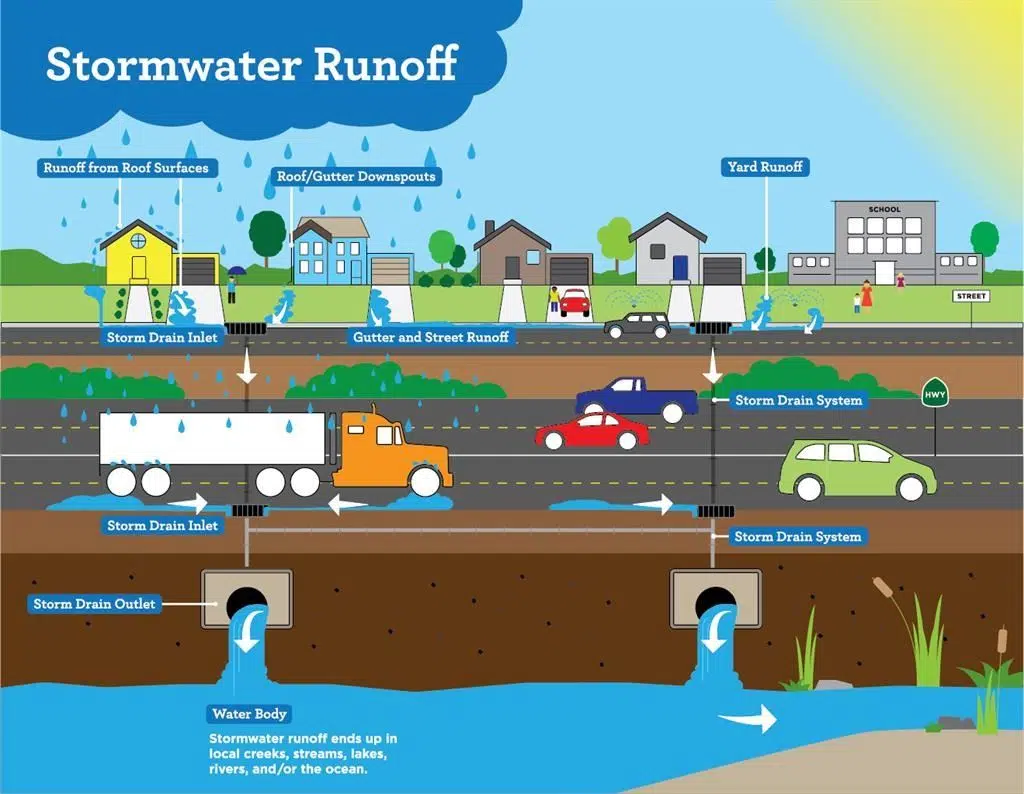Fee provides funding for drainage projects, protects city streets
(Seguin) — Drainage issues are a serious problem in the city of Seguin. Not only are there ponding and flooding issues in many parts of the city, but the lack of an adquate drainage system is also damaging the city’s streets. The city is now taking steps to improve its overall drainage system. The Seguin City Council recently approved the creation of a storm water drainage fee. The new fee will cost most residents $3 per month, but it will allow the city begin further addressing some of its drainage woes.
Seguin City Manager Steve Parker says the fee is the most equitable way for the city to begin to seriously address drainage problems. He says those issues have also become a major problem for city streets. Parker says the streets are deteriorating because the drainage system can’t prooperly handle the storm water runoff.
“The city council has directed us to put a lot of money towards the refurbishment of our streets and the maintenance of our streets. The problem is without a adequate drainage system, unfortunately those streets will not last, because water just sits on that. The number one problem with roadways is when water does sit on your streets. It doesn’t get to drain, and that asphalt doesn’t last as near as long (as it should). So we are kind of throwing good money after bad. This talented team of individuals that we have went out and found a solution. (They found) a sustainable solution that we feel like that we can actually have a dedicated funding source in the amount of a fee,” said Parker.
The city has hosted a number of public meetings to discuss the creation of the fee. It establishes a dedicated funding mechanism to address flooding and other drainage issues. Parker says they initially proposed a higher monthly fee, but later realized that the $3 monthly rate would allow the city to begin to address some of these issues.
“We started out with a $5 fee. But after talking to the audit committee, we reduced that $3 per residential unit a month. So it’s $36 per year for every residential customer. Commercial customer (fees) will be based on the amount of impervious cover that they have on their property overall. So if it’s 10,000 square feet of impervious cover — we’ll divide that by 2,500 square feet, which is the average residential unit (size). That makes a basis of four (and) we’ll multiply that times $3 and (in this case) that would be $12 a unit. That money will then be (used), this first go round, to come up with a sustainable capital improvement plan,” said Parker.
Parker says they want to be able to come up with a responsible plan for how this money will be used. He says once the fee starts being collected, it will allow them to begin to do some of the necessary planning for drainage upgrades.
“We know a lot of the projects and a lot of the areas where we need help. We need some money to actually go out and do some preliminary designs, so that we can actually come up with a cost benefit analysis related to how we spend that money that we do generate from this fund. Do we spend $5,000 in this area and help 100 homes get out of a flood area, or do we (spend more and help) a thousand homes get out of a flood area. This will help us do that. And then we can also work for the council to say — can we do more if we use more of the funds, (and) if we want to reduce the funds — we could always look at those types of issues. Unfortunately, we need a lot of money to maintain this system (and) to mow the drainage ways. If you’ve been around any of the recent floods over the last severa months, you’ve seen the impact to areas where water just stands,” said Parker.
Critics have suggested that the city look at increasing its property tax rate or using more of the city’s sales tax revenue to pay for some of these drainage projects. But Parker says that it would take a large tax increase to generate the kind of revenue that would be created by the drainage fee. He says this is a much more equitable, and he believes a better way to fund these projects.
“Anytime you charge anyone an additional fee, (people may not be happy about it),” said Parker.
“It is something, in our professional opinion, that we think is needed if we ever want to change the trajectory of our roadway system here in Seguin. We are just throwing good money after bad, if we are just paving those roads and they are only lasting for eight years, when they should be lasting 20 years.”
The council approved the fee, on first reading, during its last meeting in December. A second and final reading is expected to be approved during the council’s meeting slated for 5:30 p.m. Tuesday at Seguin City Council. The public will be given an opportunity to address the issue prior to that vote.
If the final reading is approved, the fee would start being collected in January of 2023. The city wanted to give residents and businesses a full-year to be prepared for the additional fee that would be collected at that time.





